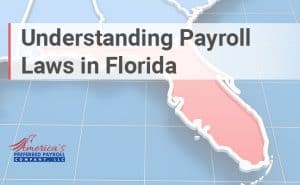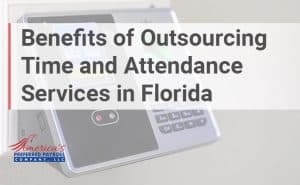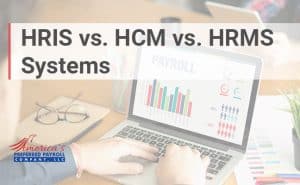Payroll in Florida is inherently challenging, partially because the days of cutting a weekly check to hardworking employees are long gone. Today’s payroll is characterized by a litany of challenges ranging from withholdings to garnishments for child support or unpaid debts, retirement contributions, idiosyncratic payment scheduling, and more.
Here’s a quick look at the ins and outs of conducting payroll in Florida.
The Subtleties of Payroll Pose Significant Challenges
As is often said, the devil is in the details. Payroll would be quick and easy if it merely required cutting a weekly check for employee labor. However, no two employers are exactly the same in terms of payment schedules, retirement plans, benefits, and other nuances. Add in federal and state regulations, and payroll becomes even more complex.
Though the sunshine state does not have a litany of state laws, there are some bureaucratic requirements that must be satisfied for payroll to be in accordance with the law. As an example, Florida employers must pay SUTA, short for state unemployment insurance tax, also known as reemployment taxes.
If you were to poll Florida business owners and managers who handle payroll in-house, most would quickly admit tackling such a project without assistance from outside experts is inherently challenging. An attempt to manually process payroll makes the project even more difficult. Payroll specialists tap into the computing and automated power of the industry’s best software. However, processing all the subtle details of each employer’s unique payroll presents obstacles.
Payroll in Accordance With Compliance Standards
Payroll that is not processed in accordance with the nuances of state and federal law poses problems for employers. Instead of attempting to overcome the legal hurdles tied to processing payroll on your own, reach out to our payroll compliance specialists. We process payroll, benefits, and more. Our compliance services include full-service payroll along with the processing of employee benefits.
Part of the challenge of payroll in Florida is surmounting legal and bureaucratic hurdles yet entrepreneurs and business professionals with years of experience often overlook the complexities of such challenges. As an example, every business is required to legally establish itself as an official employer before processing payroll.
Employers are required to have an Employer Identification Number, or EIN for short, along with an Electronic Federal Tax Payment System account. The next step in processing payroll as a business owner or manager in Florida is to register with the state. Complete the DR-1 form, submit it to the Record Service Center or submit it on the web with the assistance of our payroll specialists.
Embracing the Challenges of Payroll Processing
No two businesses have exactly the same payroll process simply because businesses are distinct entities with idiosyncratic employment and operational hurdles. Launching a payroll process entails determining the frequency of employee payment, the method of payment, tracking hours worked, and calculating work time.
Though it is possible to still complete payroll by hand, using an Excel template facilitates the process. Ideally, you will lean on a professional payroll service to address the subtleties of processing payroll in Florida on your behalf.
Payroll requires the completion and collection of worker payroll forms. New hires are to fill out and submit documents, including payroll forms, during the onboarding process. The I-9 verification form and W-4 forms are to be completed and filed as soon as possible. Furthermore, it is also prudent to coordinate direct deposit for efficient employee compensation.
Processing Payroll the Right Way
Payroll problems arise when payroll processors are not provided with accurate information or fail to process information correctly. Employee timesheets are essential to the payroll process. There should be a concrete timetable in place for gathering, analyzing, and approving employee timesheets. Though it is within the realm of possibility to use traditional paper time sheets, it is much more efficient to use time and attendance software that is much more economically efficient.
The next step is determining employee compensation on a weekly or bi-weekly basis in accordance with hours worked. Employees are to be compensated for their hours worked or salary for the time period in question with deductions for:
- Taxes
- Garnishments
- Retirement plan contributions
- Additional withholdings
Above all, payroll records are to be meticulously filed every single pay period without exception. Payroll taxes are filed with the government. Paying federal taxes is accomplished with either the monthly or semi-weekly EFTPS payment system. Our payroll specialists have the subtleties of IRS guidelines for federal taxes down to a science.
America’s Preferred Payroll is Here for Your Business
Payroll is the type of weekly project best left to those with proven expertise. Instead of attempting to get payroll done right every single time while serving your clients and attending to other important business matters, lean on our specialists to do the work for you. Contact us today at (813) 865-4205 to find out more about how we can help with your payroll, benefits, compliance and more.













